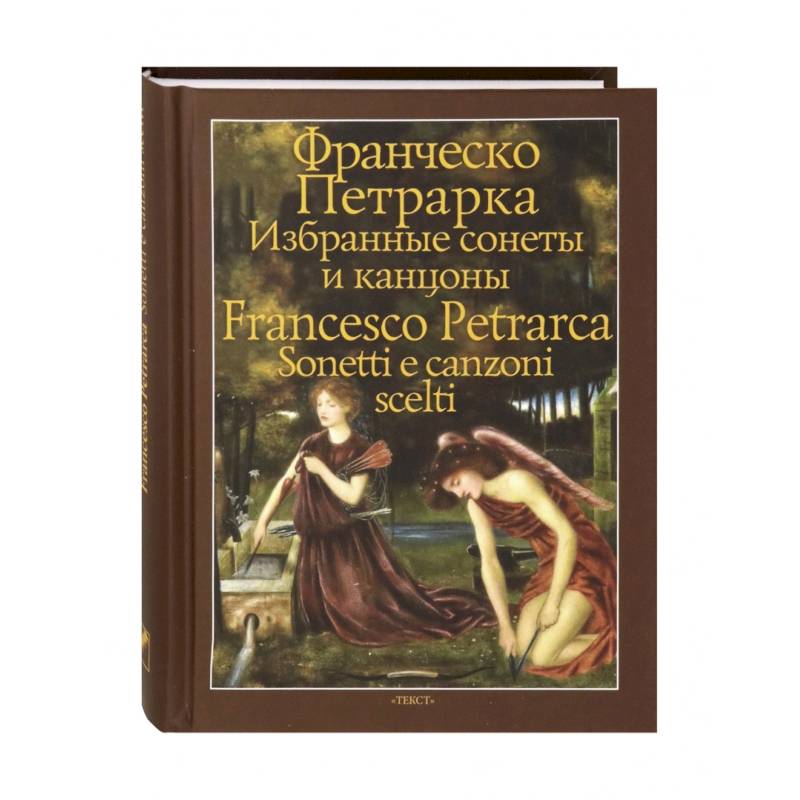Selected Sonnets and Canzons
Please sign in so that we can notify you about a reply
Sonnets and Cantsets of the great Italian poet Francesco Petrarch (1304-1374) are one of the inaccessible heights of world poetry.
gathered by the author to a single vault, called the descendants "Chancerer" ("Book of Songs"), they still cause admiration in different countries, conquering the depth of images, a subtle transmission of lyrical feeling and virtuosity of the verse.
The history of Russian translations of Petrarch, which began with G.R. Derzhavin, continues in the 21st century. This edition presents new translations of a hundred and fifty poems of Petrarch, made by Alexander Triandafilidi, unknown to the Russian reader. Seven of them will first replenish the Russian "Chancerer".
Translations are presented along with original texts and equipped with comments.
From the preface of the compiler A. Triandafilidi:
"On the morning of April six, 1327 in the Avignon Church of St. Clara, an event significant for the entire world culture occurred - Petrarch saw Laura.
Love for her originated at first sight in a passionate Monday. Later, the poet called this day a passionate Friday, likening his love suffer from the passions of Christ. On the Day of Holy Friday, he timed to two other main events of his life: the birth of the plan of the Latin poem "Africa" (1338) and the arrival of the Lavra by the Lavra according to ancient Roman custom (1341) Such a coincidence, not the only one in the life of the father of humanism, was not, of course, random.
Who was Laura, the subject of such an elevated and unrequited love of Petrarch? Researchers have long identified the mistress of his hearts as Laura Neva, the wife of the knight Hugo de Sad, who gave birth to eleven children to her husband. Her quiet life flowed in Avignon in a family circle and broke off in the year of black death (the so -called the terrible epidemic of the plague of 1348), and the Irony of Fate was also the sixth of April, just on the twenty -first anniversary of her meeting with Petrarch. Again an amazing coincidence. Three months after Laura, also from the plague, a person close to Petrarke also dies in Rome - his patron and friend Cardinal Giovanni Colonn.
This information about historical Laura is exhausted. Everything else is in the verses of the great poet ... "
gathered by the author to a single vault, called the descendants "Chancerer" ("Book of Songs"), they still cause admiration in different countries, conquering the depth of images, a subtle transmission of lyrical feeling and virtuosity of the verse.
The history of Russian translations of Petrarch, which began with G.R. Derzhavin, continues in the 21st century. This edition presents new translations of a hundred and fifty poems of Petrarch, made by Alexander Triandafilidi, unknown to the Russian reader. Seven of them will first replenish the Russian "Chancerer".
Translations are presented along with original texts and equipped with comments.
From the preface of the compiler A. Triandafilidi:
"On the morning of April six, 1327 in the Avignon Church of St. Clara, an event significant for the entire world culture occurred - Petrarch saw Laura.
Love for her originated at first sight in a passionate Monday. Later, the poet called this day a passionate Friday, likening his love suffer from the passions of Christ. On the Day of Holy Friday, he timed to two other main events of his life: the birth of the plan of the Latin poem "Africa" (1338) and the arrival of the Lavra by the Lavra according to ancient Roman custom (1341) Such a coincidence, not the only one in the life of the father of humanism, was not, of course, random.
Who was Laura, the subject of such an elevated and unrequited love of Petrarch? Researchers have long identified the mistress of his hearts as Laura Neva, the wife of the knight Hugo de Sad, who gave birth to eleven children to her husband. Her quiet life flowed in Avignon in a family circle and broke off in the year of black death (the so -called the terrible epidemic of the plague of 1348), and the Irony of Fate was also the sixth of April, just on the twenty -first anniversary of her meeting with Petrarch. Again an amazing coincidence. Three months after Laura, also from the plague, a person close to Petrarke also dies in Rome - his patron and friend Cardinal Giovanni Colonn.
This information about historical Laura is exhausted. Everything else is in the verses of the great poet ... "
Author:
Author:Petrarka Francesco
Cover:
Cover:Hard
Category:
- Category:Arts & Photography
- Category:Languages
- Category:Reference books
Publication language:
Publication Language:Italian, Russian
Paper:
Paper:offset
Series:
Series: bilingual
Age restrictions:
Age restrictions:14+
ISBN:
ISBN:978-5-7516-1560-4
No reviews found
